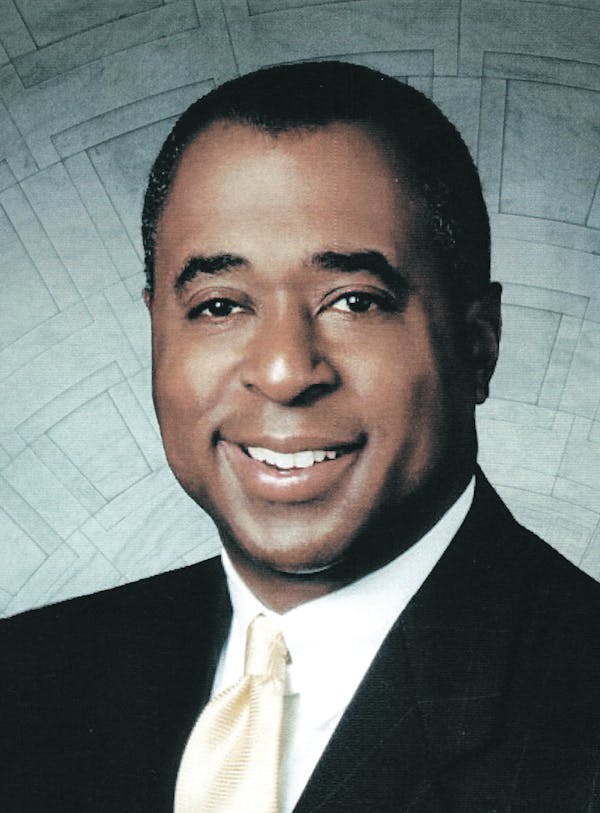
Anderson, Warren
2006 - The Anderson-DuBose Co.
Warren Anderson traveled the world and changed careers before he created the largest black-owned company in Ohio — Anderson-Dubose Co.
Warren Anderson can cover his desk with trophies honoring his career.
He's particularly proud of being named Ernst & Young Northeast Ohio Entrepreneur of the Year in 1997 and National Minority Male Entrepreneur of the Year by the U.S. Department of Commerce in 2002.
"They are my Oscar and Emmy," says Anderson, president and CEO of Anderson-DuBose Co. in Solon.
But the successful businessman hardly rests on his laurels.
"I'm operating a business in an ever-changing environment," he says. "What made me good five years ago is irrelevant today."
Anderson-Du Bose, the largest black-owned company in Ohio and one of the largest in the nation, distributes paper and dairy products, fresh produce, frozen meat and fish, Happy Meal toys and other supplies to nearly 300 McDonald's restaurants in Ohio, Pennsylvania and West Virginia.
Anderson and college friend Stephen DuBose bought controlling interest in the McDonald's distributorship in 1991 from The Martin-Brower Co. In 1993, Anderson acquired DuBose's shares, and two years later, he purchased Martin-Brower's interest, becoming the sole owner. He has since grown Anderson-DuBose to a $130 million company with a long list of happy customers. One of those is Jed Greene.
"Warren took a company that did a good job for us and he's done a better job," says Greene, who has owned McDonald's restaurants in Oakwood Village and Macedonia since 1984. "It's been a win-win for us."
Anderson has struck gold as a supplier to the Golden Arches. But he didn't rise up through the fast-food ranks: He traveled the world and changed careers before ending up an entrepreneur.
Born in Detroit 50 years ago, Anderson became a jet-setter as a toddler. His father was a diplomat with the U.S. Foreign Service, and his mother ran an international education foundation. Between 1958 and the mid-1960s, Anderson lived in Nigeria, Tanzania, Zambia, Honduras, Nicaragua and other countries.
After earning bachelor's and master's degrees from the University of Michigan, Anderson became a journalist for The Voice of America, an international broadcasting service funded by the U.S. government. For three years, he compiled background reports on Eastern Europe. Then he joined a major television broadcasting firm in Connecticut, where he worked for 14 years.
A defining moment in Anderson's career occurred when he says he was terminated unfairly from his position as senior manager.
"It was so painful because it was a career I really loved," recalls Anderson. "I decided at that point that I'd never be an employee again. I started looking at how to do an acquisition."
Anderson researched a variety of businesses. "I wanted to buy a business with leveragability," he says. "In the mid-1980s, broadcasting was coming off a couple of lean years, so I looked for other businesses where I could use my skills. Distribution was one of them."
He turned to McDonald's, a client when Anderson worked in broadcasting: "They were — and still are — a premier company to do business with," he says.
Because Anderson had no background in distribution or business operations, he approached the fast-food giant with a unique proposal. He agreed to work full time for free while training in the industry.
"All I asked was that if I demonstrated the qualities they would like in a vendor, that they help orchestrate me buying a distributorship," says Anderson.
After two years working in four distribution companies throughout the Midwest, Anderson and DuBost bought their Solon distributorship, one of the 15 owned at the time by Martin-Brower.
Several years later, Anderson structured a joint venture to purchase a distribution company in post-apartheid South Africa. It served McDonald's restaurants from centers in Johannesburg and Cape Town.
"It was one of the most thrilling chapters in my career," say Anderson. "To be an African-American and help in nation building in my own little way was something I'm very proud of." In 2003, Anderson sold the South African company to the management team he groomed.
For 15 years, Anderson has steadily grown his company in a competitive marketplace. "He has a nose for business," says Tim Brown, owner of New Horizons Baking Co. The Norwalk-based bakery serves 1,330 McDonald's restaurants in seven states. "Warren understands if you don't watch the pennies, you'll never get the dollars."
Anderson has driven initiatives at Anderson-DuBose aimed at increasing productivities and creating a more efficient delivery cycle. "In a fairly gray market, we've managed to implement creative efficiency ideas that keep our costs very low," he says.
Yet the consummate businessman is a supporter of labor, too. Steve Nobil has been friends with Anderson since the mid-1990s and also serves as Anderson-DuBose's labor and employment attorney. The partner at Millisor & Nobil in Cleveland remembers guiding Anderson through difficult employee contract negotiations. "The business objective was to reduce labor costs and increase production," says Nobil. "But Warren wanted the employees' income and business expectations protected. He insisted on it."
Whether scrutinizing the company's profit-and-loss statements or negotiating contracts, Anderson is prepared for the trials of running a multimillion-dollar business.
"I've overcome some challenges, and I've got some looking at me dead in the eye today," he says. "So bring it on."
He applies that bravado to one of his company's newest challenges, assuring food safety and quality in the post-9/11 era.
"Having the McDonald's arches on the sides of my vehicles is a significant honor and represents a significant target for people who want to make a statement against American icons," he says. Anderson-DuBose receives and ships hundreds of thousands of items daily. The company has implemented numerous measures to ensure the integrity of its products.
Anderson puts equal energy into strengthening the community. He currently serves on several boards of trustees, including Playhouse Square's. "The arts represent an important part of any community," he says. "It's one thing to make money. But cultural organizations bring life and vitality to the community."
So where does this world traveler and corporate tycoon prefer to spend his time?
"I've got two small kids, and the best place is wherever I'm with them," he says simply. That's not a surprise to Nobil, who calls Anderson loyal and trustworthy.
"I wish I had more friends like Warren Anderson," says Nobil.
Northeast Ohio could use more men like him, too.
Written by Susan Keen Flynn

)